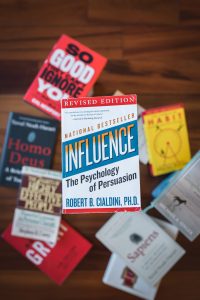Psychological Thinking in practice: The Science of Persuasion

A William Woods University Online Bachelors in Psychology opens up dozens of career fields. Beyond job placement, the program truly prepares students to be psychological thinkers, building invaluable skills in the areas of management, communication, negotiation, and emotions. Psychology is the study of the human mind and human behavior, and understanding is built in the field by observing and interrogating behaviors, building off of insights from previous research to shed light on the mystery of the mind. Every day, every second, your brain is taking in a world of outside influences, experiencing a continuous stream of emotions and thoughts, and unconsciously making thousands of tiny decisions; studying psychology is all about investigating this invisible world of human behavior. One fascinating concept drawn from psychological research involves the “art of persuasion” and the age-old question of how humans influence each others’ decisions.
Have you ever been so convinced by someone’s argument that you found yourself agreeing without fully understanding why? Perhaps a social media ad campaign led you to buy something you never intended. Try to remember – did you sign up for a free mailing list before making the purchase? Were you offered a discount or other advantage for signing up? Did the advertising make you feel seen and known, did it model your beliefs? Did the ad include praise from an expert or celebrity, or perhaps comment on the product’s overwhelming popularity? Finally, did the shop’s site show low stock remaining on the item?
 Humans like to believe we are rational decision-makers, but there are proven tricks to persuasion that override our logical minds; tricks that advertisers, political campaigns, and individuals use every day to try to influence us to make their desired choice. Psychology and marketing professor Robert Cialdini identified six persuasion principles in his seminal 1984 book Influence: The Psychology of Persuasion, based on his observations from undercover training at used car dealerships, fundraising organizations, and telemarketers. The six principles all have to do with the context surrounding your decision, rather than the information itself, and marketers use the principles (as in the example above) to influence us towards buying by forcing the customer into a context where the logical decision is to make the purchase. Today, as in the above example, we face more advertising and persuasion than ever from online, and often interact as much with others online as we do in person. The William Woods online BA in psychology program acknowledges emerging questions of online behavior, and is uniquely suited to do so as a fully online course of study.
Humans like to believe we are rational decision-makers, but there are proven tricks to persuasion that override our logical minds; tricks that advertisers, political campaigns, and individuals use every day to try to influence us to make their desired choice. Psychology and marketing professor Robert Cialdini identified six persuasion principles in his seminal 1984 book Influence: The Psychology of Persuasion, based on his observations from undercover training at used car dealerships, fundraising organizations, and telemarketers. The six principles all have to do with the context surrounding your decision, rather than the information itself, and marketers use the principles (as in the example above) to influence us towards buying by forcing the customer into a context where the logical decision is to make the purchase. Today, as in the above example, we face more advertising and persuasion than ever from online, and often interact as much with others online as we do in person. The William Woods online BA in psychology program acknowledges emerging questions of online behavior, and is uniquely suited to do so as a fully online course of study.
Robert Cialdini’s six principles of persuasion:
- Reciprocity: The persuader makes you feel a social obligation to say yes to them by doing you a favor, putting the ball in your court to return the favor. The hypothetical online marketing campaign above offered a special discount and perks to people on the mailing list. Giving a customer this small gesture of kindness before they make a purchase increases the chances that the customer will make a purchase eventually.
- Commitment/consistency: The persuader hooks you in with an earlier commitment so that you are more likely to stay committed to your decision rather than contradict your earlier choice. Our hypothetical ad campaign did this by offering a free mailing list. Having customers first opt-in to association with their brand increases the odds that they will opt in completely via a purchase.
- Social proof/consensus: Most people will look to the crowd for insight on difficult decisions, and advertisers know this. Advertising a product’s popularity makes the customer feel like a member of the in-group or majority, and makes non-buyers feel like outcasts.
- Authority: The appeal to authority is all about trust. Positive testimonial from an authority or expert whom customers trust implicitly is an effective way for advertisers to make a pitch without having to convince the audience of their own credibility.
- Liking: Similar to how we seek to reciprocate acts of kindness, people tend to be more willing to agree with someone they like. Cialdini explains that we like people who are similar to us, people with whom we share mutual goals, and people who give us complements. Liking can be established on a first impression, or even between a customer and a brand.
- Scarcity: This is a sales technique we’ve all encountered: if there is less of something available, we desire it more strongly. This principle plays on our fears, specifically the fear of missing out, also known as FOMO. When a good or service becomes scarce, FOMO kicks in and people are more likely to seek it out to avoid missing the chance, even if they were initially apathetic about the product.
Understanding the principles of persuasion and why they work can help you achieve your professional goals, whether it be selling yourself as a job candidate, marketing a product, or applying for funding and grants. In job interviews, for example, having a sense of who your interviewer is and the culture of the company can help you note common interests, position yourself as a good fit, and be instantly well liked. In addition, strong references are a use of the authority principle, and applying to multiple jobs at once gives you the advantage of scarcity.
The more you study Cialdini’s writings, as well as other writings on persuasion from authors like Vance Packard, J. Scott Armstrong, or Daniel Pink, the more likely you are to notice when a person or ad is trying to persuade you using Cialdini’s principles. Then, you can avoid being pressured into a “yes” and gain the opportunity to interrogate deeper: what exactly is this person trying to persuade me of, and why? This is psychological thinking: the skill of filtering behavior we observe through the lens of psychological knowledge.
The principles of persuasion are a microcosm of psychology as a whole: we can use the insights of psychological research to interrogate and inform our own behavior and understand that of others. Studying psychology opens up the invisible world of human behavior and builds interpersonal skills of communication, negotiation, and emotion which are in demand in every industry and every workplace.
So are you a person who finds yourself asking the big questions about why we are the way that we are? Do you have a deep well of curiosity and a desire to think in new ways? A knack for observing human behavior? Are you eager to work on psychological studies or treat patients directly in therapy? Or perhaps you’re seeking a job in the fields of healthcare, education, mental health, casework, counseling, sales and marketing, top and mid-level management, or human resources? Whatever your individual goals may be, the William Woods Online Bachelors in Psychology is a step towards reaching them, offering a flexible structure so that you can continue to work or study another subject while completing the program. No persuasion techniques necessary here, the William Woods online psychology major is simply a great option.

